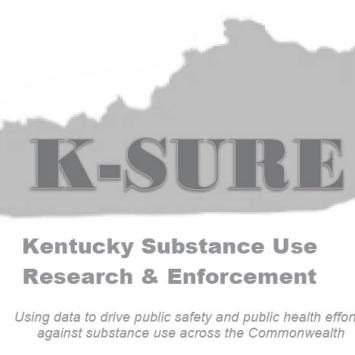Kentucky Substance Use Research and Education (K-SURE)
The integrated K-SURE collaborative regularly produces data reports/briefs to identify hot spots and drug threats within the state of Kentucky. These data reports/briefs inform public health and public safety prevention and response activities and are instrumental in funding of other Kentucky State Police drug-interdiction grants. Through OD2A funds, the maintenance of the K-SURE collaborative, formerly known as Kentucky Substance Use Research and Enforcement, will continue and reports/briefs will continue to be produced and disseminated. Outcomes include improved coordination of public health and public safety drug-related efforts; increased use of shared data to inform and enhance integrated public health/public safety prevention and response activities; and improved community and state utilization of evidence-based approaches to prevention, intervention, and referral to treatment.
Angel Initiative
Kentucky State Police established the Angel Initiative pilot program in 2017 with two posts and went statewide in April 2018 in all 16 KSP posts covering all 120 counties in Kentucky. All individuals entering a KSP post that seek substance use disorder treatment interact with a post representative (victim advocate, social worker, victim advocate, or KSP officer) who searches FindHelpNowKY.org for a treatment facility with an opening. Transport to the facility is then arranged. KyOD2A will support the overall coordination and evaluation of the Angel Initiative in all 16 posts and support Angel victim advocates that refer individuals to SUD treatment. Improved coordination of public health and public safety drug-related efforts will assist in improving community and state utilization of evidence-based approaches to prevention, intervention, and referral to treatment; Increased community leveraged resources for SUD prevention.
Crisis Intervention Team (CIT)
CIT is a best practice model for intervention with persons experiencing a mental health crisis or who are under the influence of drugs. CIT includes specific training on mental health diagnoses, psychiatric medications, drug use, mental health law, cross-cultural sensitivity, and verbal de-escalation skills. KyOD2A will support training of law enforcement, who will then return to their respective posts to train other officers. Increasing the number of CIT-trained officers will help improve community and state utilization of evidence-based approaches to prevention, intervention, and referral to treatment.

